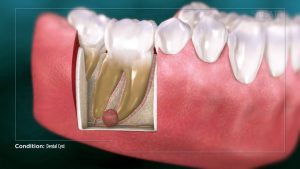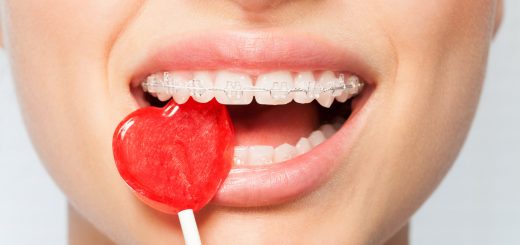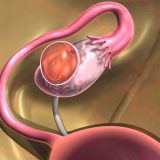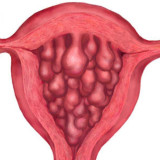A tooth cyst is a cavity with an epithelial membrane filled with fluid. This is a benign formation, which, however, requires treatment. To make it in time, it is better to know all the dental cyst symptoms.
The cause of these tumors in the oral cavity may be improper development of the tooth and surrounding tissues. Also among the causes are various inflammations. Especially often these inflammations are provoked by caries. Therefore, it must be timely treated.
Tooth cyst can give the patient a lot of problems and cause pain. In addition, some species are dangerous by the fact that they can turn into malignant tumors.
However, not every tooth cyst brings discomfort. In some cases, the tooth cyst is asymptomatic. And it makes it difficult to diagnose for timely treatment.
What should you pay attention to? How to understand that it is time to see a doctor?
Dental cyst symptoms
Initially, a tooth cyst often does not give symptoms. It is detected accidentally during x-ray diagnostics, for example, in the dental pantograph’s image.
In case of a larger dental cyst, it can be accompanied by the growth or stretching of adjacent to the tooth tissues, their deformation. Also, the tooth can be displaced, protrude or on the contrary, go inside the oral cavity.
Pain as one of the dental cyst symptoms occurs when there is inflammation.
A characteristic symptom of a dental cyst of a root-type (associated with infection and inflammation of the pulp) is a kind of a capsule or cavity with purulent contents. It usually occurs on the gum next to the affected tooth root. This capsule has the form of a pink-red bulge, and pus from it sometimes flows.
We can designate several dental cyst symptoms.
In case of a tooth cyst growth and reaching it to a large size, the following will happen:
- facial asymmetry
- displacement of the tooth
- loosening of teeth
- pathological fractures
Also among dental cyst symptoms can be noted inflammatory or tumor infiltration in the affected area. That is, the appearance of a capsule on the surface of the gum with the accumulation of cellular elements with an admixture of blood and lymph. This ulcer, as a dental cyst symptom, does not heal completely (in the absence of the cyst treatment), can be easily damaged, and begin to bleed again.
There are other dental cyst symptoms, indicating the development of the tumor. They are not directly related to the site of the injury. The list of these dental cyst symptoms includes:
- painful or difficult swallowing
- sore throat
- hoarseness
- pain in the tongue
- non-healing wounds in the mouth or spots on the mucous membrane
- discharge from the pharynx and mouth
- nasal congestion
- swollen or swollen neck.
If these dental cyst symptoms persist for a long time, at least for 3 weeks, you need to consult a specialist!
In addition, some of dental cyst symptoms are nonspecific. It means they can indicate presence of a wide range of diseases. Including dental cyst, but not always.
- sudden denture becomes not suitable (due to deformation of the jaw, teeth, gums)
- a tumor in the ear area in combination with a lesion of the facial nerve (usually a drooping corner of the mouth)
- loosening of healthy teeth
- offset of the eyeball
- enlargement of several lymph nodes in the neck at the same time
- fever
- in some cases of tumors, breathing problems may occur due to pressure and overlap, for example larynx, by the tumor.
What to do if you experience dental cyst symptoms
These symptoms of a tooth cyst do not always indicate this type of lesion. Additional dental cyst diagnosis is necessary to make accurate diagnosis.
If you notice these symptoms, it is always best to see a doctor. Tumors that occur in the mouth, lips, head and neck are often very dangerous. Even those that are benign tumors.
How does a doctor diagnose dental cyst?
The basis medical diagnosis is the collection of detailed data about the patient and making a complete clinical picture. So at the beginning the doctor asks the patient’s age, profession and job specialization. This is necessary to identify the likelihood of a specific negative impact of harmful factors. It is possible that they are specific and suggest the development of the tumors. For example, workers of the chemical industry are exposed to dangerous substances that provoke the appearance and active development of the tumors.
Then doctor the asks about the duration of the symptoms, the intensity of their manifestation, similar symptoms in the past, smoking, a sudden decrease or fluctuation in weight. As well as any cancer in the family. This is important because it indicates a genetic predisposition.
Further medical examination involves palpation of the affected area, lymph nodes, nerves and bone system, which often metastasize tumors of the head and neck.
During the examination, the doctor determines the location of the tooth cyst, its size, cohesion (that is, the nature of the tumor tissues – its hardness and elasticity), color, tenderness, displacement and influence on neighboring tissues and organs.
Also, during the dental cyst diagnosis, the doctor examines the state of the lymph nodes. This is very important, because it is in them most often in the first place there are metastases.
The basic principle of dental cyst diagnosis and examination is the absence of pressure. Touches should be soft, so as not to cause mechanical damage to the tumor. Because as a result, its cells can spread to neighboring or even distant tissues, as well as get into the blood.
Laboratory tests such as blood tests, leukocyte system, ESR, urine, protein, calcium, phosphorus and other compounds in the blood, as well as bone marrow tests help greatly in dental cyst diagnosis. The main advantage of such medical tests ащк dental cyst diagnosis is the ability to determine the nature of the tumor. In other words – to identify whether the tumor is cancerous, or it is a benign cyst.
Based on the data collected during the dental cyst diagnosis, the doctor prescribe treatment.















